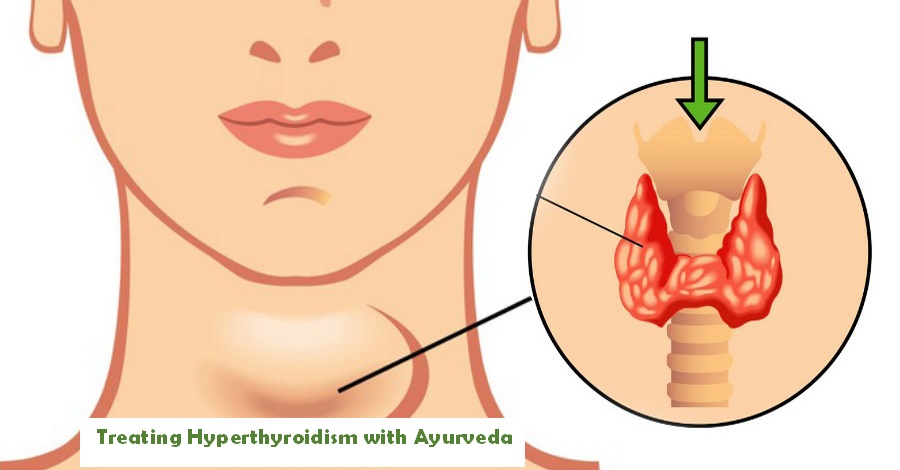Treating Hyperthyroidism with Ayurveda – Hyperthyroidism is a clinical condition resulting from an increased level of t3 and t4 and decreased level of ‘Thyroid Stimulating Hormone’ which indicates–Thyroid Gland Hyperactivity.
Symptoms—
Fever, restlessness, weight loss, fatigue, sweating, heat intolerance, hand tremors, nervousness, irritability, palpitation, excessive fatigue, shallow respiration and menstrual disturbances.
Causes of Hyperthyroidism according to Ayurveda—
Pitta is the source for all the metabolic actions of the thyroid gland. According to Ayurveda, the reason for this dysfunction is kapha, Vata and Pitta doshas. Improper digestion leads to thyroid dysfunction due to blocked channels in the body. The disorder is believed to occur due to the ‘Aggravation of Vata and Pitta doshas’. The aggravated Vata and Pitta cause over-stimulation of the Agni [metabolic fire], that leads to excessive hunger, heat intolerance, excessive sweating, weight loss, vitiation of the doshas, and the direct depletion of Ojas [essence of tissue metabolism and support for our immune system]. In turn, this leads to increased production of Ama or undigested food waste. The Ama is then absorbed into the blood together with the imbalanced Doshas– (Vata, Pitta, and Kapha) and as a result, the Agni [metabolic fire] starts to crash.
The malfunctioning of Agni moves up, to the level of Shukra Dhatu hindering the formation of healthy tissues one after another, till the configuration of Ojas is affected. Once the quality of Ojas is disturbed, the vitiated Vata and Pitta along with Ama, blocks the body channels. This causes the immune system to malfunction, thus attacking the thyroid gland and leading to a full-blown autoimmune condition.
Ayurvedic Management of Hyperthyroidism—
Ayurveda aims to heal the root imbalance of hyperthyroidism rather than treat symptoms for the rest of a patient’s life. The patient needs to reduce their stress through lifestyle changes and take therapeutic herbs to heal from this chronic disease. The first line of Ayurvedic management for hyperthyroidism is to clear the channels to bring the body’s energy into equilibrium and restore normal function of the thyroid gland. Hyperthyroidism reflects profound derangement of Vata and Pitta doshas.
Diet and Lifestyle suggestions—
- Include enough quantity of milk, pure ghee and milk products every day.
- Eat fresh fruits like bananas and melons, dry nuts like dates and walnuts, etc. which pacify the aggravated Vata and Pitta.
- Yoga and Meditation help in balancing the over aggravated Vata and Pitta doshas.
Home Remedies—
- Mix cabbage, mustard greens, kale and radishes and drink one cup of this mixed juice once every day.
- Take about 10 gm [2 tsp] of dhania seeds (coriander) and add it to a glass of water. Boil and cool it. Filter the mixture and take twice a day.
- Mix equal quantities of long pepper (Pipali), black pepper and dry ginger powder and consume half teaspoonful twice a day with lukewarm water.
Come to ‘The Madras Institute of Ayurveda’[MIA], a complete centre of Ayurvedic Medicine and treatment in Chennai, where procedures ranging from Panchakarma to rejuvenation, are all performed. Care begins with a proper diagnosis, based on which the doctors create a treatment plan to treat the disease and not just the symptoms.
MIA is established to bring the natural treatment of Kerala, with all facilities to a more accessible location.
Log on to www.miayurveda.org to discover more about our treatment plans.


